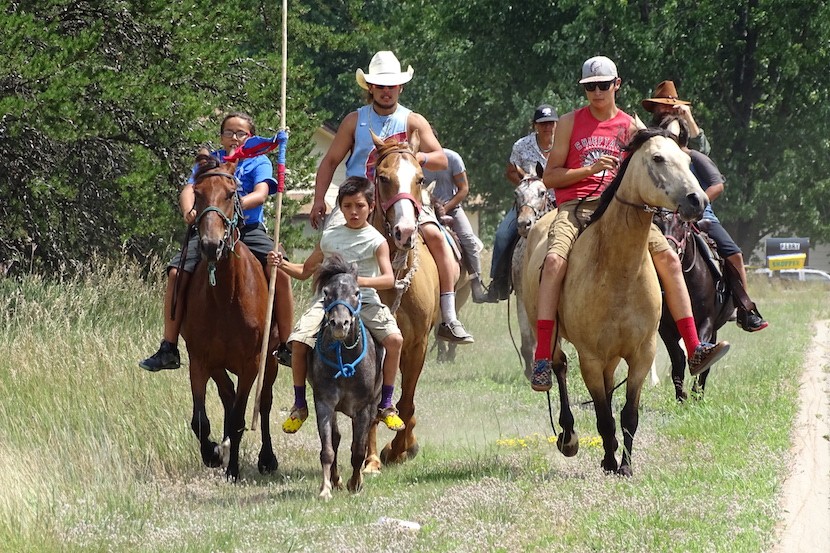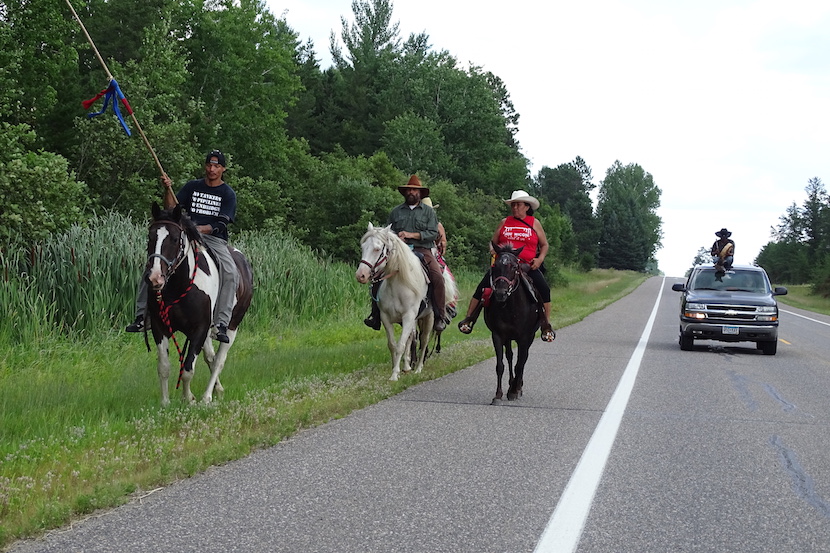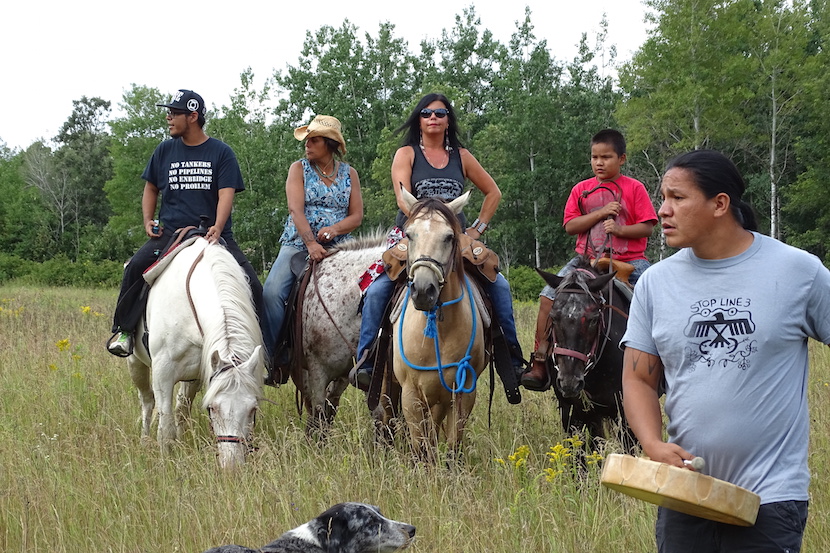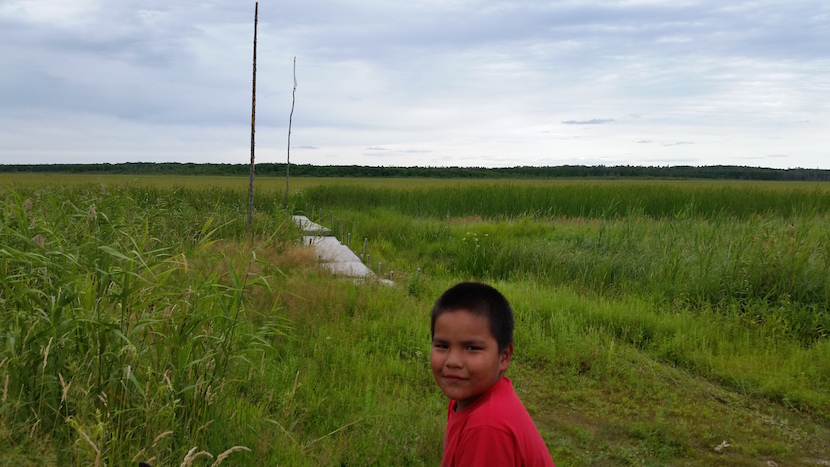
The power is shifting. Some say it started at Standing Rock where the people stood their ground at the Cannonball River. It was five years ago, though, that White Earth’s Winona LaDuke had a dream about riding horses against the current of the oil in Anishinaabe territory. This July marked the 5th Annual Love Water Not Oil Ride sponsored by Honor the Earth, the non-profit organization LaDuke directs. The ride was longer and had more participants than ever before. I was honored to be one of them.
The trail swept east to west from Nekoosa, Wisconsin, where Enbridge desecrated Ho-Chunk effigy mounds, to Rice Lake on White Earth Reservation where Enbridge plans to put wild rice at risk. According to state DNR and tribal reports, we have already lost 70 percent of our wild rice, but between mining, pipelines and climate change, much more may be lost. Enbridge is seeking Minnesota approval to expand its Line 3 pipeline. The old Line 3 will be “decommissioned” in place and left in the ground, increasing the probability of legacy contamination, while the new Line 3 corridor goes through the best wild rice territory in the state. The pipeline is planned to cross the Mississippi river within miles of the headwaters. It’s a grim proposition for Northern Minnesota and anyone downstream.
The ride started in Wisconsin this year, traveling against the route of Enbridge’s Line 61, a recently expanded 40-inch pipeline that may be doubled again with twin pipeline Line 66 if Enbridge receives approval on Line 3. Canadian Enbridge’s excessive land demands for these Wisconsin pipelines have sparked an eminent domain controversy with many private non-native landowners concerned about the issue of giving a foreign company the right to take land from US citizens without their consent. It’s only one of many problems for citizens that would affect Minnesotans as well.
Pipeline issues are not a recent development. The hard-fought battle against the Enbridge Sandpiper proposal, which followed the same corridor as the proposed Line 3, took years. But in August 2016, Enbridge announced it would not proceed with the Sandpiper and instead bought 28 percent of the Dakota Access Pipeline. Enbridge’s lack of intervention during the violence and injustices against water protectors in North Dakota are of deep concern for many Minnesotans. The way LaDuke sees it, “Enbridge is responsible for 28 percent of the injuries, bullets, and associated trauma incurred at Standing Rock.”
Therefore, she rides. “We live in a place where you can get sugar from a tree. There’s medicine all around,” she says. It’s unique, sacred, and worthy of protection.
This year, LaDuke gathered Anishinaabe from Mille Lacs, White Earth and Leech Lake as well as Lakota and Dakota participants, the Slim Buttes Riders, the Crow Creek Boys, and members of the Dakota 38 riders. Non-native supporters were welcomed on the ride as well. Twenty-seven horses and dozens of riders traveled together for a month.
Honor the Earth staff members managed logistics while Fond du Lac tribal members, businesses, and farms donated food and provided meal support. Each night, the camp was hosted by concerned citizens in local communities. The Mille Lacs Band hosted the camp at our own Anishinaabe Food Sovereignty farm just south of East Lake.
I joined the ride on a Monday morning while the protectors were camped in Backus. It was a sunny, relaxed atmosphere where I was welcomed to coffee and breakfast. Honor the Earth staff worked tirelessly to keep things on schedule while the riders looked after the horses and prepared to load out for the day. The starting point for the ride was in Pine River on the grounds of Hunt Utilities Group, an innovative sustainability campus.
Each morning’s ride started with a prayer. Both Dakota and Ojibwe songs, beautifully brought forth by Algin and Harvey Goodsky, Jr. of East Lake, sent off the riders and continued throughout the day. A Dakota boy named Elliot, riding a gray pony, led the ride that morning with LaDuke and the other riders following respectfully behind. It was beautiful to watch them disappear into the tall grass.
Special care was taken to make sure the horses weren’t overworked, especially on hot days, and riders often switched out to give everyone the chance to ride. Spotter cars stayed with the riders to protect them from traffic, sometimes with the Goodsky brothers riding on top to drum and sing the ride along.
August 2, the last day of the ride, was punctuated with an early visit to an Enbridge storage yard just east of Lake George on US Highway 71. There, miles of green pipe sections are stacked and waiting to go in the ground. The riders stopped outside the gate where Harvey Goodsky, Jr. sang while the rest of the riders surveyed the evidence of what may be to come.
Later, the riders arrived on White Earth Reservation and visited the vast swaths of wild rice ripening on Rice Lake. We watered the horses from the natural spring at Big Bear Landing, where cool, clean water comes right out of the ground. The riders, myself included, made the final leg of the journey through the community to the Rice Lake Community Center. Arriving at the end of this journey, where community members and a feast awaited, will always be one of the proudest moments of my life.
The ride’s purpose is to bring attention to the many pipeline campaigns that Honor the Earth is involved in, but individual participants each have their own goals as well. Tania Aubid of East Lake said, “We ride to wake up more people to transition from fossil fuels to renewable energy.” Harvey Goodsky
Jr. said he “hopes it spreads awareness to our people that we can do something to change the minds of corporations. And I hope that prayers and happiness will come from our hard work.” Other Mille Lacs Band members were also involved in the ride and are eager to share the message.
The unity that was galvanized in the fight against the Dakota Access Pipeline still persists. Native nations and non-native allies continue to come together to stand against the tide of oil.
In Winona LaDuke’s words, “We’re interested in making a beautiful future.”
For more information about Honor the Earth and the pipelines, visit honorearth.org or stopline3.org. For information about Enbridge’s land demands and the eminent domain debate, vis- it 80feetisenough.org. Hunt Utilities Group can be visited at hugllc.com.


